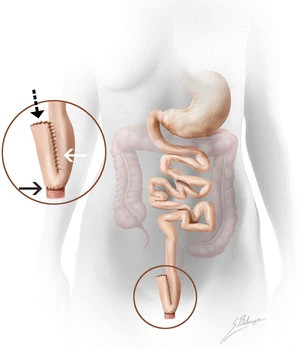
Obstruction in your small bowel can be a serious complication following surgeries like the creation of a J pouch or a K pouch. If you have undergone these procedures, it’s important to understand how surgical adhesions may form and potentially cause blockages. This article will help you learn what J and K pouches are, the surgeries involved, and how these can lead to small bowel obstructions, along with ways to address these complications effectively.
Unpacking the J Pouch
Your journey with a J pouch involves understanding how this surgical option reshapes your digestive tract. Often chosen to avoid a permanent ileostomy, the J pouch reconstructs a new reservoir from your small intestine to restore bowel function. However, surgery creating this internal pouch can lead to adhesions—fibrous scar tissue—that may cause small bowel obstructions over time. Knowing what a J pouch is and how it impacts your body helps you recognize potential complications and seek timely interventions.
What is a J Pouch?
A J pouch, also known as an ileal pouch, is a surgically created internal reservoir formed by folding the end of your small intestine (ileum) into a “J” shape and connecting it to your rectum, a procedure called ileorectal anastomosis. This pouch stores stool temporarily, allowing for more controlled bowel movements after the removal of your colon. It acts as a new holding chamber, greatly improving the quality of life for those without their colon.
J Pouch for Ulcerative Colitis
The J pouch for ulcerative colitis offers an alternative to permanent ileostomy for patients whose colon has been removed due to chronic inflammation. By connecting the ileum to the rectum it restores a semblance of normal bowel function. This surgical option has become a standard treatment for many seeking relief while maintaining bowel continuity.
Patients with ulcerative colitis often face debilitating symptoms, and the J pouch provides both functional and psychological benefits. Its success rate exceeds 90%, giving many patients the ability to avoid an ostomy. Yet, the surgery isn’t without risks—postoperative adhesions forming around the J pouch can lead to small bowel obstructions, which sometimes manifest as J pouch blockage symptoms such as cramping and nausea. Staying informed about these risks aids in early detection and management.
The J Pouch Surgery 3 stages
J pouch surgery typically unfolds in three stages. The first stage removes the colon and creates a temporary ileostomy. The second stage (or second surgery) constructs the J-shaped reservoir from your small intestine and connects it to your anus, restoring bowel continuity. The third stage (or typically third surgery) reverses the temporary ileostomy, allowing stool to pass through the new pouch. This phased approach helps manage healing and reduces complications from a J pouch surgery; however, 3 surgeries can create scar tissue, causing complications.
J-Pouch Obstruction Symptoms: What You Should Know About Scars, Blockages & Long-Term Complications
If you’ve undergone J-pouch surgery—whether due to ulcerative colitis, familial adenomatous polyposis, or another chronic bowel condition—you’ve likely felt the relief of removing a diseased colon. But for many patients, recovery comes with a new set of concerns. J-pouch complications such as adhesions, small bowel obstructions, and persistent abdominal pain can disrupt life after surgery—sometimes months or even years later.
Fortunately, there are non-surgical treatment options, like Clear Passage Physical Therapy, that can help restore mobility and reduce symptoms caused by adhesions.
🔍 What Does a J Pouch Scar Mean for Your Health?
After surgery, you’ll typically be left with a J pouch scar, most often on the lower abdomen. While surface healing may appear complete, deeper scar tissue—or adhesions—can form around the intestines and pelvic area, sometimes sticking organs together and restricting bowel function.
👉 If you have abdominal cramping and pain, or bloating or digestive changes, it may be a sign that adhesions are forming below the surface. These internal bands of scar tissue are a known cause of post-surgical complications and are a leading factor in recurring blockages.
🚨 Recognizing J-Pouch Blockage Symptoms
Adhesions are the most common cause of J-pouch blockage symptoms. These internal scars can wrap around the bowel or kink the pouch itself, slowing or even stopping the flow of waste.
Watch for these signs:
- Intense abdominal cramping or pain
- Visible bloating or swelling
- Nausea or vomiting
- Trouble passing gas or stool
- Dizziness or signs of dehydration
If these symptoms come on suddenly, especially if you’ve had prior surgeries, you could be dealing with a partial or full obstruction.
⚠️ When J-Pouch Obstruction Symptoms Require Immediate Care
A complete blockage is a medical emergency. J-pouch obstruction symptoms not only include the above, but may also escalate to:
- Severe, unrelenting abdominal pain
- High fever or chills
- Rapid heartbeat
- Bloody or black stools
Left untreated, this can lead to bowel perforation or sepsis—so immediate hospital care is critical as was the case with Lisa Presley, who died from small bowel obstruction.
🛑 The Problem with Surgery-After-Surgery
The traditional treatment for a bowel obstruction caused by adhesions is additional surgery to remove the scar tissue. But here’s the catch: surgery itself causes more adhesions, leading to a vicious cycle of obstruction and surgical intervention.
✅ Clear Passage Physical Therapy: A Non-Surgical Alternative for Adhesion Relief
This is where Clear Passage Physical Therapy offers a powerful alternative. Their specialized hands-on therapy, backed by published clinical studies, has been shown to reduce adhesions and help restore bowel motility—without surgery.
Clear Passage focuses on treating the root cause: the adhesions. Through a patented protocol called the Wurn Technique, their therapists manually break down the restrictive scar tissue that’s often responsible for:
- Small bowel obstructions
- Chronic pelvic pain
- Recurring J-Pouch and K-Pouch complications
- Bowel motility issues
Many patients who were told surgery was the only option have found lasting relief with Clear Passage, avoiding hospitalization and additional procedures altogether.
💡 Don’t Settle for Repeat Surgery
Living with a J-pouch means staying alert to potential complications—but it doesn’t mean resigning yourself to a life of ER visits and surgical cycles. By recognizing early J-pouch blockage symptoms and understanding the risks of internal adhesions, you can explore safer, long-term solutions.
Clear Passage Physical Therapy has helped thousands reduce or eliminate J-pouch obstruction symptoms and get back to living more fully—without going under the knife again.
Managing Complications: The Role of Clear Passage Physical Therapy
Surgical adhesions from J pouch procedures often cause persistent small bowel obstructions, limiting your mobility and causing pain. Clear Passage Physical Therapy uses specialized manual techniques to gently break down these adhesions, restoring bowel motility and reducing obstruction symptoms. Studies show that up to 85% of patients experience significant improvement after therapy, easing J pouch obstruction symptoms and adhesions. By targeting the internal scar tissue without additional surgery, you can regain digestive function and improve quality of life while minimizing further surgical risks associated with the J pouch and K pouch complications.
💬 Final Thoughts
Living with a J-pouch can be empowering, but being aware of potential issues like the scarring that becomes problematic or early blockage symptoms is part of protecting your long-term health. Know what to watch for, when to call your doctor, and how to advocate for yourself if symptoms arise.





















